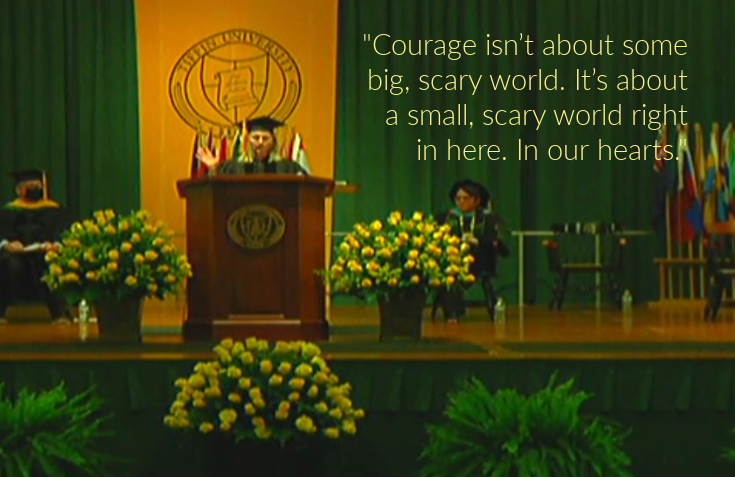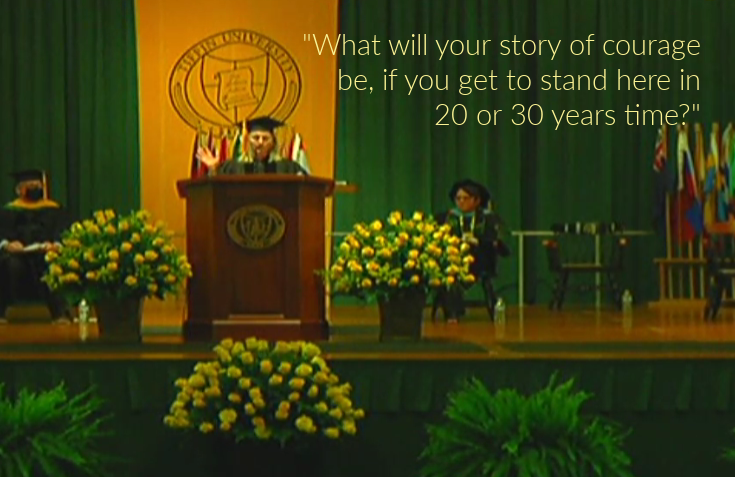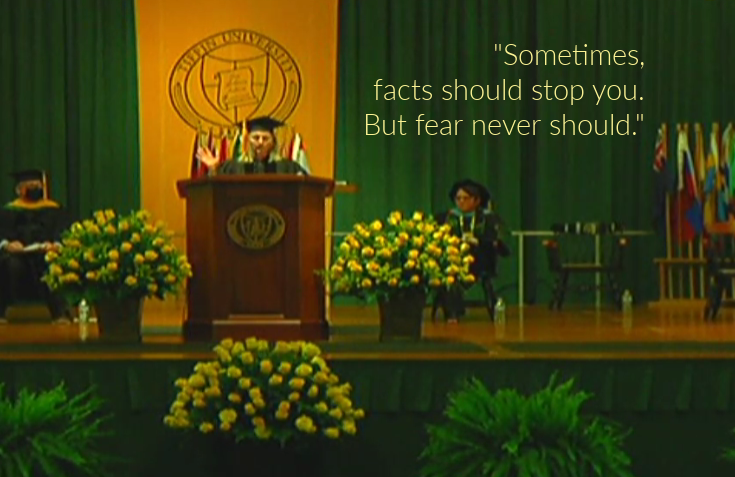A commencement or convocation speech should deliver a powerful message, one that students can draw on for inspiration in their lives beyond the academic walls. Here is how to write a commencement speech on courage or on any theme.
Commencement speeches, typically about 10 minutes long, have the power to change lives. Not usually in big ways, of course. More in the sense of giving an uplifting message that students can take with them from graduation out into the world when they need inspiration.
Sevy Petras is co-owner of Priority Life Care, a chain of retirement homes. She was invited to speak to the graduating class at Tiffin University in Ohio.
She wanted to talk about courage.
She had some great ideas. She had some references. She even had some words.
That’s where we came in. We helped polish those words into a narrative that flowed in a style she felt was her own.
An effective and powerful commencement speech needs three key ingredients.
- A universal message that students can apply broadly to life
- A speech script that conveys the message in a way they can relate to
- A motivated speaker to step forth and own the speech
The speech below is what we wrote. It shows how to write a commencement speech.
The speech in this video (introducing her at 52:30) is the speech Sevy delivered. It shows how to deliver a commencement speech.
You will notice there are numerous tiny differences. Right up to the last minute, she was making changes – improvising.
That’s what you want from a speechwriter. Not necessarily the exact final words to “read” at the lectern. You want text you can use to deliver a smooth-flowing commencement speech that sounds like you mean it. Like you own it.
Here is what Sevy had to say.
Commencement speech on courage
Dean Schumacker, Trustees, parents, and especially you students.
Congratulations!
This is a wonderful milestone in your journey through life.
Some of you have come from right here in Tiffin. Who’s here from Tiffin?
Some of you come from across Ohio. Who’s here from Ohio?
Some of you come from across the USA. Who here is from somewhere else in America?
And some of you come from all around the world. Who has come here from another country?
We come from so many different places. And despite this pandemic, we are all in this same hall. It was no small fete arranging this gathering, so I would love it if you join me in a round of applause for Dean Schumacker and the board and the rest of the team who organized this rare in-person event.
But this hall is not your destination. This hall is a portal to your destiny.
Your parents, your teachers, your counsellors – they’ve all given you their best. They have set you on the right path. I think we should show them our appreciation, too. Let’s give them a hand.
Now, it’s your turn. What they gave you, has helped you get this far. And each and every one of you knows how hard you have worked to get this far, as well. From here on in, though, it’s all up to you.
A few words about courage
I would like to say a few words … about just one word.
It’s a word we don’t hear often enough.
It’s a word some people should hear more often.
It’s a word than can carry you through your darkest times and your biggest challenges – a word than can raise you to fantastic heights and help you create your destiny.
That word is…
Courage.
I could tell you that you’ll need courage because it’s a big, scary world out there. I have to admit that facing all of you without a Zoom filter or virtual background seemed a little scary today.
But courage isn’t about some big, scary world. It’s about a small, scary world right in here. In our hearts.
We are all human. And we are all subject to fear.
It’s OK to be afraid. It really is. But it’s not OK to let fear stop you from creating the destiny you seek.
Your education took courage
Historically, a third of students drop out of college after their first year, and another third drop out before graduation. This past couple years have been more challenging than most.
Protests.
The economy.
Civil unrest.
Pandemic.
It’s enough to make a student drop out of school. In fact, it has been enough to make many, many students drop out of school – 20 to 30 percent more than in most other years.
But other students hung on. Other students kept on studying. And those other students are in this hall today. Those other students are you…and that takes courage.
Think about it for a moment. You are here because you’ve worked hard. But you are also here because you have had the courage to pursue your degree in difficult times.
Let me quote from an eminent philosopher, respected around the world – The Wizard of Oz. He said to the Cowardly Lion:
“You have plenty of courage, I am sure. All you need is the confidence in yourself. There is no living thing that is not afraid when it faces danger. The true courage is in facing danger where you are afraid, and that kind of courage you have in plenty.”
Wise words, indeed.
Your courage here at Tiffin, should give you confidence beyond these walls. In fact, nothing gives a person the confidence to overcome obstacles quite like recalling courage from one’s past.
Remember this: you graduated, when over 80 percent have dropped out.
That is courage.
And if you did in here, you can do it elsewhere.
If you did it now, you can do it again.
If you have a dream, you can have the confidence and the courage to pursue it.
Facing risks in life takes courage
Bobby can tell you a thing about courage. He had more than a few misgivings when his crazy older sister came to him and said, “Hey Bobby, let’s form a company.”
He had even more misgivings when she said: “And let’s work for free.”
Well, Bobby did join me in creating Priority Life Care. So did a few others, and we worked for free and we built a great company that is doing great things for people who might not otherwise be able to afford assisted living in their old age.
That took courage.
And look what that courage did.
Look what it did for us.
Look what it did for those elderly people.
Look what it is doing for our society.
But that’s our story. What will your story of courage be, if you get to stand here in 20 or 30 years time?
What does courage mean?
In practical terms, what does courage mean? It means taking a risk. That’s all. That risk could be real or imagined.
If the risk is real, don’t ignore it. Courage does not mean being stupid, and I am sure you are all smart enough to take a real risk seriously.
But far too often, people live in fear of imaginary risks. A little research can help you determine the difference between real and imaginary risks.
I know you thought that you were done with pop quizzes for the rest of your life, but I’m going to spring one on you anyway.
Which of these risks should stop you from pursuing something you had set your hopes on: real risk or imaginary risk?
Let me hear you! Real, or imaginary?
Sorry, I can be a little mischievous sometimes – that was actually a trick question.
You should not let imaginary risks stop you from anything. That’s pretty obvious.
But you should not let real risks stop you, either.
Bobby and I started our company without taking a salary in 2008, during the worst financial crisis of our lifetime. We had some very real risks to face. And we had to decide whether it was smart or stupid to take those risks.
We did our research, so we understood exactly what the risks were.
We decided that the benefits were worth the risk.
And we made plans to reduce each of those risks, making it even smarter to take them.
And that is my challenge to you. Meet risk face-to-face. Gather the facts, measure the risk, figure out if you can reduce or overcome the risk…then make a decision based on real information – on facts – not on fear.
If your plan is to set up a lemon aide stand in a war zone, you might conclude that the risk is too great and the reward too small. But if your plan is to reduce crime or start up a new sports team or found your own company, have the courage to pursue it if it is viable.
Sometimes, facts should stop you. But fear never should.
Education breeds confidence
I said at the start that this is a wonderful milestone in your journey through life. But it is more. This is the destiny you have created though years of courage and perseverance. Let that sink in. Savor the moment.
Now, commit this moment to memory – a memory to recall the next time you need courage.
You have come from near and far. Unlike 80 percent of students this year, you saw your plans through to graduation. I have faith that you can see your plans through the rest of your lives.
Confucius said:
“Education breeds confidence. Confidence breeds hope. Hope breeds peace.”
You have the education.
You have shown the confidence.
Now go out and create the peace, the innovation, the inspiration or whatever other destiny you envisage.




